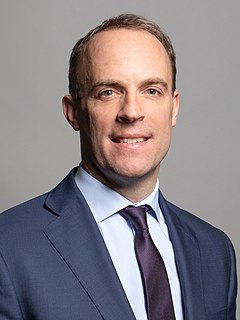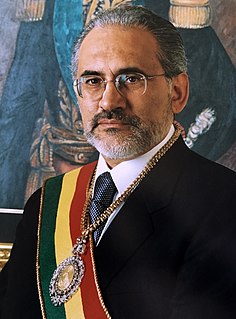A Quote by Dominic Raab
Personally, I would prefer Britain to remain within a more flexible E.U., with access to the single market but without the excessive regulation or constant efforts to direct social, justice, or foreign policy. But if that's not possible, I believe this country could - and should - thrive outside the E.U.
Related Quotes
I believe in market economics. But to paraphrase Churchill - who said this about democracy and political regimes - a market economy might be the worst economic regime available, apart from the alternatives. I believe that people react to incentives, that incentives matter, and that prices reflect the way things should be allocated. But I also believe that market economies sometimes have market failures, and when these occur, there's a role for prudential - not excessive - regulation of the financial system.
We are apt to say that a foreign policy is successful only when the country, or at any rate the governing class, is united behind it. In reality, every line of policy is repudiated by a section, often by an influential section, of the country concerned. A foreign minister who waited until everyone agreed with him would have no foreign policy at all.
What a nightmare it would be if we individually had to criminalise every single abuse of every single commodity, market or financial product. There are thousands of these and new ones being invented every day. Such an approach would have disastrous implications for regulation and policy-making. Any slide towards it must be resisted.
I do believe that India needs a lot more foreign direct investment than we've got, and we should have the ambition to move in the same league many other countries in our neighborhood are moving. We may not be able to reach where the Chinese are today, but there is no reason why we should not think big about the role of foreign direct investment, particularly in the areas relating to infrastructure, where our needs for investment are very large. We need new initiatives, management skills, and I do believe that direct foreign investment can play a very important role.
Foreign policy always has more force and punch when the nation speaks with one voice. To remain secure, prosperous, and free, the United States must continue to lead. That leadership requires a president and Congress working together to fashion a foreign policy with broad, bipartisan support. A foreign policy of unity is essential if the United States is to promote its values and interests effectively and help to build a safer, freer, and more prosperous world.
A famous, very often quoted phrase says: "That government is best, which governs least." I do not believe this to be a correct description of of the functions of a good government. Government ought to do all the things for which it is needed and for which it is established. Government ought to protect the individuals within the country against the violent and fraudulent attacks of gangsters, and it should defend the country against foreign enemies. These are the functions of government within a free system, within the system of the market economy.
British rule depends upon repression and collaboration and the Irish people should recognise that those who collaborate with Britain in exchange for a slice of the cake will implement British policy and remain silent when Irish people are murdered and oppressed. It is they who are responsible for prolonging the war in Ireland. Without the quislings, without the collaborators, we would already have reached freedom.
An EU without Britain, without 1 of Europe's strongest powers, a country which in many ways invented the single market, and which brings real heft to Europe's influence on the world stage which plays by the rules and which is a force for liberal economic reform would be a very different kind of European Union.
































